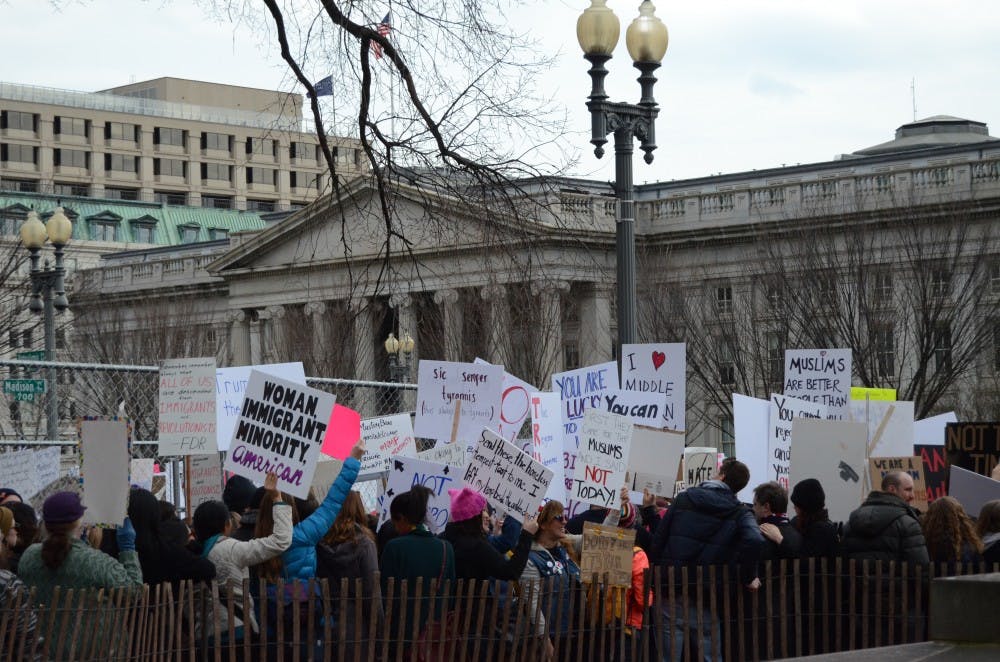The Washington Post’s article series “Refuge” highlights the terrible reality facing millions of Syrian refugees, a reality made worse by unequivocally false narratives about refugees. Recently, “The Eagle” published an op-ed on President Trump’s travel ban. Austin Cirillo, the author, argued that it is more humanitarian to deny Syrian refugees’ freely given right to movement than to grant it.
Cirillo has every right to voice his opinion, but we also have the right to dissent with the specific aim of showing how myopic, incorrect and dangerous such a view of refugee resettlement is.
In the first place, Cirillo argues that resettling Syrian refugees costs too much money, citing the anti-immigration Center for Immigration Studies. Specifically, Cirillo claims that resettling Syrian refugees “costs taxpayers $64,370—12 times what the UN estimates it costs to care for one refugee in neighboring Middle Eastern countries.”
Let’s ignore the fact that other sources dispute this figure. The important part, it seems for Cirillo, is the taxpayer, who—by his reasoning—deserves equal or greater value than refugees in our consideration of humanitarian issues.
Let that sink in. Taxpayers are as important a humanitarian issue as refugees.
Yet even if we (could) equivilate taxpayers and refugees, Cirillo gets the economics wrong. In many cases, the short term costs of accommodating asylum seekers are borne by international donors, not governments. In fact, Oxford University’s Roger Zetter notes that short term accommodation programs total about $8.4 billion globally, though economists “rarely analyze the economic outcomes of their program[s].”
Instead, they “tend to assess the impacts and costs for the host community” as a percentage of GDP regardless of whether or not the government actually pays for the accommodations provided to refugees. Such analyses ignore the fact that, while aggregate demand for publicly funded goods may increase in the short term, the cost of meeting that demand almost always puts strain on NGOs, the UNHCR and international donors, not governments.
Moreover, refugees’ potential strains on public finances have almost nothing to do with their consumption of public goods. One study by Joakim Ruist from the University of Gothenburg found that four-fifths of refugees’ net fiscal impact resulted from their lower-than-average tax contributions, while only one-fifth was due to “higher per-capita public costs.” In other words, refugees’ net fiscal impact has to do with their inability to pay taxes, so if refugees drain the public purse, it’s because they aren’t fully integrated into the labor market.
The other side of the coin is Cirillo’s claim that it’s cheaper to resettle Syrian refugees in neighboring countries. Again, Cirillo seems to make an economic point here, not a humanitarian one. But to the extent that it is a humanitarian issue, we’ve seen throughout history what happens when refugees are simply left near the areas of persecution they originally fled.
In the 1980s, the Guatemalan army snuck into Mexico to kidnap and murder indigenous refugees who fled genocide, an action decried by the UN at the time. Guatemala is also just one of several examples that include South Africa, Rwanda, Cambodia and El Salvador, among others. We have seen time and again how leaving refugees in neighboring countries doesn’t make them safer; it sweeps the problem under the rug, making the humanitarian situation worse.
Most of Cirillo’s argument about culture rests on a “Clash of Civilizations” influenced framework and inaccurately assumes he possesses a fully informed understanding of Syrian culture. He believes that culture is a definable entity and that everyone he shoehorns into it abides by its every tenet. To the detriment of his own argument, he fails to define specifically what Syrian culture is, thereby reducing it only to its treatment of women and homosexuals.
Does every Syrian act this way? Are Syrians the only ones that treat people of marginalized communities poorly? Is Syria the only country in the region that subordinates women to men? What about the rest of the world? What, specifically, is unique to Syria that makes its refugees more prone to committing rape? Cirillo’s claims reek of Islamophobia, alluding to the belief that surely “those” people are intrinsically different from us Westerners.
The main piece of evidence supporting this claim, that Syrian refugees totally abide by a culture inherently opposed to Western ideals, offers a weak argument. Cirillo assumes that all Syrian individuals agree with Syria’s inarguably misogynistic state-sanctioned treatment of women.
Yet, Syria was one of the countries destabilized by protests during the Arab Spring. Is it impossible for a government to be incongruent with its citizens? If so, we must assume against all reason that a population fighting to overthrow a regime agrees with that very regime’s policies.
The fact is that Syrians escaping state-sponsored terror are just as diverse, dynamic, flawed, gifted, vibrant and human as the rest of us. Islam or culture are just veneers over how people really behave.
Is the father that struggles to support his family on meager wages unique to any one part of the world? The fact that one goes to a mosque instead of a church, speaks in a different language, or comes from a different background is not cause for fear, it is something to celebrate, especially when it makes you uncomfortable. We are all a part of a beautiful and rich tapestry of humanity.
We’ll end with this: in 1939 the St. Louis sailed from Hamburg, Germany to Havana, Cuba, carrying just under 1,000 Jews. As the refugee ship neared Cuba, American supported right-wing newspapers and officials urged the United States to prevent refugees from settling. Ultimately, the ship was sent back to Hamburg. Only 278 of the original passengers survived the Holocaust.
We don’t bring up the most infamous genocide in history for posterity. For anyone following the refugee issue, the parallels are striking. Giving into fear of the “other” and conflating the suffering of people fleeing persecution with the inconvenience of having to pay slightly higher taxes or facing the inevitability of cosmopolitanism helps to perpetuate tragedy so one can feel comfortable only seeing the familiar faces of white America.
Adam Goldstein is a senior in the School of Public Affairs.
Bill Kakenmaster is a senior in the School of International Service.





